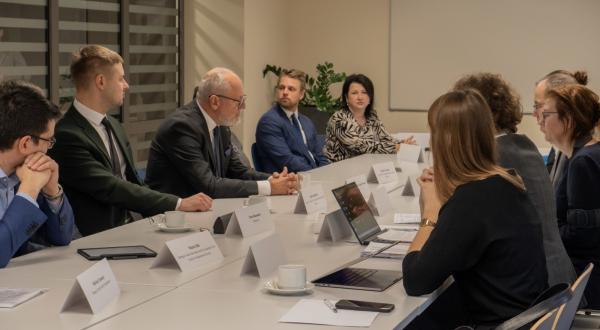Erasmus+ students explore food and the urban environment: international anthropology fieldwork in Riga
This spring, social sciences students from Rīga Stradiņš University (RSU), the University of Padua (Italy), and Masaryk University (Czech Republic) participated in the Erasmus+ Blended Intensive Programme “Current Debates in Cultural Anthropology.” This year’s theme, “Thinking with spaces for and of eating and food,” explored the interconnections between place, food, and eating.
Through a series of lectures, participants were introduced to key concepts in the anthropology of food. Professor Donatella Schmidt from the University of Padua provided an overview of the field, while Associate Professor Martin Čuta from Masaryk University examined food’s connections to environmental issues, health, urban spaces, migration, and identity. Special attention was given to the role of food in identity construction in Italy, explored by Associate Professor Paride Bollettin, also from Masaryk University. RSU’s own associate professor and social anthropologist Klāvs Sedlenieks presented his fieldwork in the Montenegrin village of Njeguši, focusing on the traditional method of preparing pršut.
Practical introduction to local food culture
During the program’s in-person component in Rīga, participants, guided by architect and social anthropologist Matīss Šteinerts, visited Lucavsala to learn about the culture, potential, and challenges of urban allotment gardens. Students also attended a lecture by RSU visiting researcher Marc Morell, who spoke about the inextricable link between food and tourism, as well as the inevitable gentrification driven by the tourism industry. RSU researcher Jānis Šabanovs introduced students to digital ethnography methods, emphasizing their growing importance in research, while architect Anna Wilczynska presented the urban environment as a space for food production in Estonia and Poland and how these practices connect to global food systems.
Fieldwork in the Riga neighbourhoods
As a culmination of the program, students conducted fieldwork in various Riga neighbourhoods – Āgenskalns, Ķengarags, Mežaparks, the Old Town, and Lastādija – observing eating spaces and interviewing both food vendors and consumers. Their research took them to locations such as the Central Market, Āgenskalns Market, popular café chains, supermarkets, institutional cafeterias, food stalls, and lesser-known local spots. A memorable experience was the visit to the "Lāči" bakery, where students learned about the traditional Latvian process of baking rye bread.
Cross-cultural experience and research growth
Participants emphasized that meeting peers from different countries offered valuable opportunities for cultural exchange and new insights into how something as seemingly ordinary as food shapes us and influences the environment around us. The course encouraged students to see the familiar in new ways, step outside their comfort zones, and pose unexpected questions that will guide future inquiry.
A tradition that continues
The joint Erasmus+ Blended Intensive Programme “Current Debates in Cultural Anthropology,” organized by RSU, the University of Padua, and Masaryk University, has grown into an inspiring international tradition. In 2023, students and lecturers met in Padua, and in 2024, the program continued in Brno, Czech Republic.
















